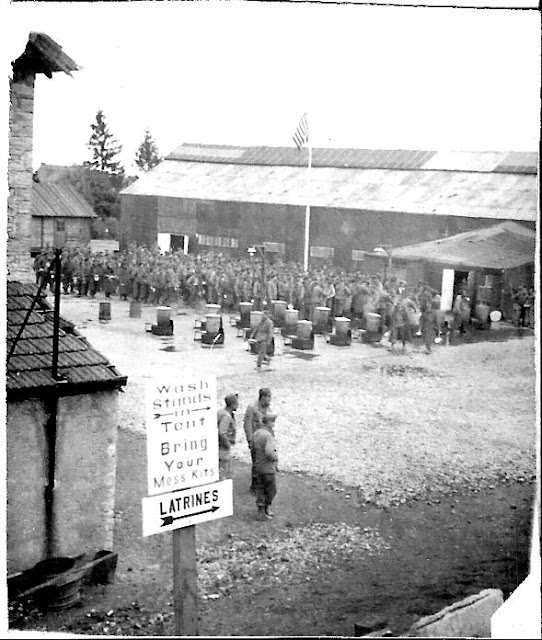 |
| Chow time instructions and line up. Those may be some wash stands out in the open too, with puddles around them and an extra layer of gravel laid down to keep the mud in check. |
Marilu: This looks like a big camp set up to handle large numbers of troops to house and feed until the time comes to load them onto their ships. The mood must have been relaxed and elated as the wheels were now in motion for a return to civilian life and loved ones at home.
According to a letter posted earlier in this blog, This was probably Camp Boston and Lu and many others were here for over a month waiting to move to an area to board a ship.
Cliff Hope in his book talks about his returning home experience:"20 November: Then began a dismal, four-day ride in a truck convoy to the Calas Staging Area near Marseilles. The stops were few and far between. We arrived at the Calas staging area, a desolate-looking place....We were in unlighted, winterized tents. The 13 days we spent waiting were the usual stuff-hurry up and wait, long lines and ridiculous chores. For instance, Service Battery was ordered to nail waterproof paper on the urinal troughs in the latrine."
When Boarding the ships-" Getting up at 5 am we loaded into huge trailer trucks to go to the port of Marseilles on 6 December. Some four hours later we started to board the John Jay, a liberty ship. On board, warm quarters and good food awaited us."
 |
| Tents for a temporary stay. A brief 'home sweet home" |
 |
| Just passing time. That's Lu in the doorway. There must have been some amount of leisure since this was a holding camp. |
 |
| Add caption |
 |
| Here's Lu, sitting in the doorway reading something to pass the time. |
 |
| Goofing off... |


Comments
Post a Comment